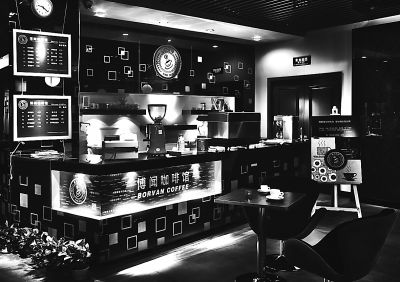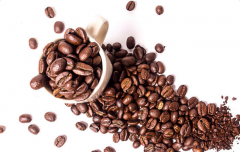Tasting | Why is some coffee so sweet?

For professional baristas, please follow the coffee workshop (Wechat official account cafe_style)
The coffee is bitter?
No, you're out of date. Now, picky and savvy coffee lovers and consumers want to drink a cup of coffee with a hint of sweetness every morning-you know, I don't mean coffee with sugar.
But why is coffee sweet? More importantly, how do we bake and extract our coffee to maximize this sweetness? I'm going to answer these questions.
The roasting process of coffee beans will affect its sweetness.
What is sweetness?
The generally accepted definition of sweetness is that it is the taste produced by high-sugar substances in food. The most common are large amounts of sweet substances and carbohydrates. These carbohydrates include sucrose (common sugar) and lactose (in milk).
In the Wheel of Flavor, the masters offer the following insight: there are too many sweet substances (salty, sour or bitter) that can be expressed in our taste buds, even in other delicious dishes. However, we need to appreciate the "balance" and "roundness".
In other words, sweetness may not be good for whitening our teeth, but it is an important part of flavor balance.
Sweetness is essential for a balanced taste.
Why do we like sweet food and drinks?
Humans and other animals show a tendency to eat sweets-which has something to do with evolution. In general, sweet foods inspire us, while bitter substances mean they may be poisonous. We humans are more sensitive to bitterness than sweetness, because eating habits are directly related to our human evolution.
When we were teenagers, we tasted the first cup of coffee and beer in our lives, a bitter taste that we will never forget, and this "bitter drink" is often handed over by our friends or parents. But as we grow up, we will eventually get used to bitterness, because the power of time is really powerful.
Of course, sweetness is more natural to us. Just like lactose that babies enjoy breast milk and lovers around the world, candy and chocolates are given to each other as gifts are given. You see, the people who deliver coffee beans must be baristas who bet on orphans--
Humans tend to prefer sweet food to bitter food.
What kind of sugar is in coffee?
Carbohydrates account for "50% of the total dry weight of coffee" in black coffee, the Food and Beverage Network reported. These include sucrose, arabinose, mannose, glucose, galactose, rhamnose and xylose.
Of course, not all of these sugars are soluble in water. The coffee in our cup actually dissolves only part of it.
The sugar content in coffee also depends on the variety of coffee beans, planting conditions and environmental factors. Arabica beans, for example, contain almost twice as many sugars as robusta beans, which is one of the reasons why Arabica varieties are praised as of better quality. So you may find that bourbon coffee is sweeter than Katim's coffee.
Also, the slower the coffee cherry ripens (for example, because it is at a higher altitude), the more sugar it produces. In addition, honey-treated beans are usually sweeter than washed beans.
Honey-treated coffee is usually sweeter than washed coffee
Why is some coffee not sweet?
Although there are many influencing factors, in fact, most mature, healthy and flawless Arabica coffee beans have a certain degree of sweetness. If it is really not sweet, there must be something wrong with some of the treatment, such as picking mixed with immature coffee fruit and improperly preserved and deteriorated. A COE cup tester once said: "the average maturity of coffee at harvest is directly related to sweetness."
So, if the coffee you drink is really not sweet, does that mean there is something wrong with its beans? No, not necessarily. The roasting and extraction of coffee beans will also affect the sweetness and bitterness of coffee, and even affect your taste buds.
You can highlight the sweetness of coffee by extraction.
The sweetness of baking
Sugar plays an important role in the baking process, especially in the Maillard reaction. Rob Hoos wrote in changing the flavor map of coffee: a coffee roaster's monologue: "this chemical reaction begins in the early stages of baking because amino acids can act as catalysts for most reducing sugars, eventually catalyzing complex non-enzymatic saccharification."
How can you understand this sentence if you are not a scientist? Don't worry, neither am I. A large number of organic compounds (more than 600) and various melanins and complex browning products will be created.
Then, after the first burst, the sugar is converted into caramel, especially sucrose, which contains the most. Don't forget that coffee is actually a kind of fruit. Interestingly, the longer the baking time, the more kinds of sugars, the more complex, and even end up producing bitter caramel compounds. Yes, sweetness to bitterness is not just a joke.
All the delicacies start with an explosion!
Extract sweetness
If you have a bag of roasted coffee beans, the next step is to extract. But this is definitely not an easy task-we need to keep trying and changing to find the sweet "golden cup extraction".
Why is this so difficult? Because we need to find a balance, we need to extract as many sweet substances from coffee powder as possible, but not blindly. Once extracted, the coffee will become bitter and astringent, and the bitterness will mask the sweetness.
To extract sweetness, we need to constantly and carefully change the extraction parameters, and after getting the appropriate parameters, we also need to control all variables to ensure that this state can be repeated in each extraction in the future. One more thing-coffee beans will oxidize, over time, your coffee also needs to constantly change the parameters to adjust!
The extraction of sweetness requires attention to details.
If coffee is sweet, why do some people still add sugar?
However, there are still many people who think that coffee is very bitter, and even some people can't drink it without adding one or two packets of sugar. Part of the reason has something to do with history: the first coffee that many people come into contact with is instant coffee, which is deep-baked with shoddy Robota beans, masking all the good or bad flavors, leaving only bitter instant coffee that can never be swallowed without sweetened milk. Another part of the reason for adding sugar is habit.
When the barista sent a cup of warm coffee that had just been made to the guest, the guest asked voluntarily, "is there any sugar?" For the barista, it was a critical blow.
Sugar can mask or even change the flavor of coffee. Nowadays, a lot of coffee has been carefully planted, processed, roasted and brewed professionally, and there is no need to add sugar to drink it.
But we still have to understand what the guests are doing. As a professional barista, we seek the most delicious coffee because we know exactly which flavors are the most enjoyable. But our guests are not necessarily professional, huh? They may not be able to taste those rich and complex flavors.
Another reason is that the taste buds of those who add sugar to coffee are not necessarily as sensitive to sweetness as we baristas.
Professionals are more sensitive to sweetness than others.
How to train the ability to feel sweetness
The diet of modern people contains a lot of sugar, which is very sweet and greasy. For example, a 12-ounce (335ml) cup of cola contains about 39 grams of sugar-nearly eight packets of sugar. Imagine someone ordering a medium latte and pouring seven or eight packets of sugar into it.
Ironically, most foods that are high in sugar are synthetic. Natural foods, such as coffee, other fruits and milk, which are most likely to feel sweet, are relatively low in sugar.
According to Danish sensory scientist Ida Steen, there is a way to improve your ability to taste sweetness by inhibiting intake-reducing the amount of sweets in your diet, especially sugary foods.
Finally, do an experiment: prepare a glass of orange juice and a glass of lemon juice. First drink orange juice and taste its acidity and mild sweetness. Next drink lemon juice, you will feel very sour, can not help but shiver that kind of sour! But this is a very valuable and important experiment. Finally, if you try orange juice again, you will find that it is sweeter and less sour than it was when you first tasted it. In this case, you don't want to add some sugar.
Conclusion
The carefully processed and brewed coffee itself is very delicious and sweet. We just need to learn to taste. In other words, we just need to learn to appreciate.
Important Notice :
前街咖啡 FrontStreet Coffee has moved to new addredd:
FrontStreet Coffee Address: 315,Donghua East Road,GuangZhou
Tel:020 38364473
- Prev

[Manning topic] which is more suitable for Manning, hand punch, siphon or Philharmonic pressure?
For professional baristas, please follow the coffee workshop (Wechat official account cafe_style) Mandheling, which is located in Sumatra, Indonesia, Asia, also known as Sumatran Coffee. The main producing areas of Indonesian coffee are Sumatra, Java and Sulawesi, among which Mantenin from Sumatra is the most famous. Manning has a strong taste.
- Next

How to write a coffee-controlled composition for the college entrance examination?
Professional barista communication please follow the coffee workshop (Wechat official account cafe_style) these two days is the college entrance examination day, the editor's circle of friends has been smashed by 18-year-olds in your hearts, so why don't we coffee control also write the gaokao composition? Composition questions of the 2017 National Unified examination for the enrollment of ordinary Colleges and Universities (60 points): Chinese key words: Belt and Road Initiative, Giant Panda,
Related
- Beginners will see the "Coffee pull flower" guide!
- What is the difference between ice blog purified milk and ordinary milk coffee?
- Why is the Philippines the largest producer of crops in Liberia?
- For coffee extraction, should the fine powder be retained?
- How does extracted espresso fill pressed powder? How much strength does it take to press the powder?
- How to make jasmine cold extract coffee? Is the jasmine + latte good?
- Will this little toy really make the coffee taste better? How does Lily Drip affect coffee extraction?
- Will the action of slapping the filter cup also affect coffee extraction?
- What's the difference between powder-to-water ratio and powder-to-liquid ratio?
- What is the Ethiopian local species? What does it have to do with Heirloom native species?

